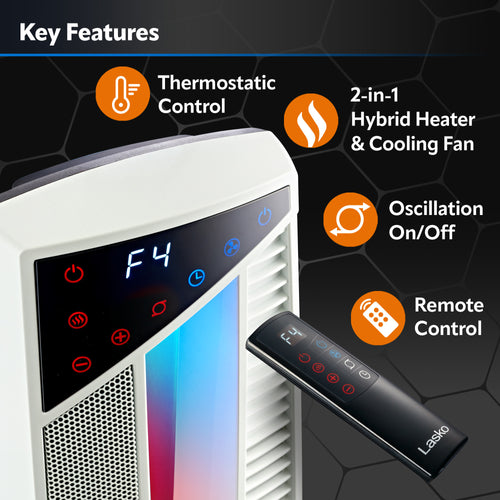Table of Contents
Key Points
In the sweltering heat of summer, air conditioning is often seen as a modern-day necessity, providing us with respite from the oppressive temperatures. But beyond the obvious comfort it offers, air conditioning plays a crucial role in supporting our physical and mental well-being. In this article, we will explore the profound impact of proper cooling on our health and overall quality of life.
In the sweltering heat of summer, air conditioning is often seen as a modern-day necessity, providing us with respite from the oppressive temperatures. But beyond the obvious comfort it offers, air conditioning plays a crucial role in supporting our physical and mental well-being. In this article, we will explore the profound impact of proper cooling on our health and overall quality of life.
1. Heat-Related Ailments: Avoiding the Dangers
When temperatures soar, our bodies are pushed to their limits. Heat-related illnesses such as heat exhaustion and heatstroke become real threats, particularly for the elderly, young children and those with underlying health conditions. Air conditioning acts as a shield against these dangers, ensuring that our bodies remain within a safe temperature range and minimizing the risk of potentially life-threatening ailments.
2. The Restorative Power of Sleep
Quality sleep is a cornerstone of good health. During hot summer nights, sleep can become elusive, leading to fatigue and reduced cognitive function during the day. Air conditioning creates a comfortable sleep environment by regulating indoor temperatures. This, in turn, promotes restorative sleep, which is essential for physical recovery and mental clarity.
3. Enhanced Air Quality for Respiratory Health
Many modern air conditioning systems are equipped with air filters that help remove allergens, pollutants and particulate matter from the air. This is a boon for individuals with allergies or respiratory conditions like asthma. Cleaner, filtered air can improve lung health and overall well-being, making indoor spaces safer and more comfortable.
4. Mood and Mental Health: A Cool Connection
The link between temperature and mood is well-established. Extreme heat can lead to irritability, anxiety and even aggression. Conversely, a comfortably cool indoor environment promotes a calm and pleasant atmosphere, reducing stress and anxiety. By maintaining a temperate climate indoors, we can create a haven for mental well-being, fostering emotional stability and positivity.
5. Increased Productivity and Focus
Whether it’s at home or in the workplace, a cooler environment can boost productivity and concentration. Heat-induced lethargy and discomfort can hinder performance, while proper cooling supports alertness and efficiency. In an air-conditioned space, you’re more likely to tackle tasks with vigor and stay engaged throughout the day.
6. Environmental Considerations
While air conditioning is undeniably beneficial for our health and comfort, it’s also essential to consider its environmental impact. As cooling systems consume energy, they contribute to greenhouse gas emissions and climate change. Exploring energy-efficient cooling options and sustainable practices can help strike a balance between personal comfort and environmental responsibility.
Conclusion: A Vital Aspect of Well-Being
Air conditioning is not merely a luxury; it’s a vital component of a healthy and comfortable lifestyle, especially in regions with scorching summers. Beyond offering a refuge from the heat, it actively contributes to our physical and mental well-being. As we navigate the challenges of climate change and increasingly warm summers, the role of air conditioning in supporting our health and quality of life becomes ever more significant. So, whether at home, work or elsewhere, maintaining a comfortable and well-cooled indoor environment is an investment in your overall well-being and happiness.
Should you desire more in-depth information, it’s available for your perusal on this page: The importance of greenspace for mental health – PMC

Key Points
Improved Sleep QualityAdequate sleep is the cornerstone of good health and air conditioning can significantly contribute to achieving a restful night’s sleep. When your bedroom is at a comfortable temperature, your body is better able to regulate its internal thermostat, leading to deeper and more restorative sleep. Quality sleep is essential for physical recovery, mental clarity and emotional well-being.
Improved Sleep Quality:
Adequate sleep is the cornerstone of good health and air conditioning can be a game-changer when it comes to achieving a restful night’s sleep. Here’s a closer look at how proper cooling enhances the quality of your sleep and why it’s vital for your overall well-being:
Temperature Control: Your body’s ability to regulate its internal temperature is crucial for falling and staying asleep. A bedroom that’s too hot or too cold can disrupt this natural process, leading to discomfort and restlessness. Air conditioning allows you to maintain a comfortable and consistent sleeping environment, supporting your body’s temperature regulation mechanisms.
Deeper Sleep: A cool and comfortable bedroom promotes deeper and more restorative sleep. When your body is not preoccupied with trying to cool down or warm up, it can focus on essential restorative processes, such as tissue repair, muscle growth and memory consolidation.
Enhanced Sleep Patterns: Air conditioning can help regulate your sleep patterns. Consistent and comfortable sleeping conditions signal your body that it’s time to rest, making it easier to establish and maintain a healthy sleep routine. This is particularly beneficial for individuals with irregular schedules or those prone to insomnia.
Reduced Disruptions: External factors such as street noise, humidity or seasonal allergens can disrupt sleep. Air conditioning can filter the air, reduce humidity and create a quiet and controlled sleeping environment that minimizes these disruptions.
Emotional Well-Being: Quality sleep is closely tied to emotional well-being. Inadequate sleep can lead to increased stress, irritability and mood swings. Conversely, when you consistently experience restful sleep, you’re better equipped to manage stress, regulate emotions and maintain a positive outlook.
Cognitive Function: Sleep plays a crucial role in cognitive function and memory consolidation. Proper cooling in your bedroom ensures that your brain can efficiently process information and retain what you’ve learned during the day.
Physical Recovery: Air conditioning aids in physical recovery, especially after strenuous activities or workouts. Cooler temperatures reduce inflammation and muscle soreness, helping your body recover faster and more effectively.
Respiratory Health: For individuals with respiratory conditions like asthma or allergies, air conditioning can provide relief by filtering out airborne allergens and maintaining optimal indoor air quality. This promotes uninterrupted breathing during sleep.
Long-Term Health: Consistently experiencing quality sleep through air conditioning is associated with numerous long-term health benefits, including a reduced risk of chronic diseases like obesity, diabetes and heart disease.
Family Comfort: Air conditioning extends its benefits to your entire family. Children, in particular, may have a more challenging time falling asleep in uncomfortable conditions. Providing a cool and comfortable sleeping environment ensures that everyone in your household gets the sleep they need for growth and development.
In conclusion, air conditioning is not just about comfort; it’s a vital tool for promoting improved sleep quality and overall well-being. By creating the ideal sleeping environment with proper cooling, you enable your body to achieve the restorative sleep it needs. This, in turn, leads to better physical health, emotional stability, cognitive function and a higher quality of life for you and your loved ones.
To delve further into this matter, we encourage you to check out the additional resources provided here: Keep Your Cool in Hot Weather | Environmental Health Features

Exploration
Heat-Related Health BenefitsProlonged exposure to high temperatures can lead to various heat-related illnesses, such as heat exhaustion and heatstroke. Air conditioning provides a safe refuge from these dangers, especially for vulnerable populations like the elderly, young children and those with certain medical conditions. By maintaining a cool indoor environment, you reduce the risk of heat-related health issues.
Indeed, air conditioning is not merely about comfort; it’s a critical factor in safeguarding our health, particularly when dealing with extreme heat. Let’s delve deeper into the multitude of health benefits that air conditioning offers, especially for those most susceptible to heat-related illnesses:
Preventing Heat Exhaustion and Heatstroke: Heat-related illnesses like heat exhaustion and heatstroke can have severe consequences, including organ damage and even death. Air conditioning creates a refuge from sweltering temperatures, allowing your body to cool down and preventing the onset of these potentially life-threatening conditions.
Protection for Vulnerable Populations: Certain groups are more vulnerable to the adverse effects of heat, including the elderly, young children, pregnant women and individuals with preexisting medical conditions. Air conditioning is a lifeline for these populations, offering a controlled, cool environment that reduces the risk of heat-related health issues.
Aid in Recovery: If someone does experience heat-related illness, air conditioning is essential for their recovery. Rapid cooling in an air-conditioned environment can be a life-saving intervention for individuals suffering from heatstroke, as it helps lower body temperature and prevent further damage.
Improved Sleep Quality: Adequate sleep is crucial for overall well-being and sleeping in a comfortably cool room is conducive to restful sleep. Air conditioning ensures a restorative night’s sleep, which has a positive impact on physical and mental health.
Respiratory Health: Air conditioning can help improve indoor air quality by filtering out allergens, pollutants and contaminants. This is especially beneficial for individuals with respiratory conditions like asthma or allergies, as it reduces their exposure to triggers that can worsen their symptoms.
Reduced Dehydration: In extreme heat, the body loses fluids rapidly through sweat, increasing the risk of dehydration. Air conditioning can help maintain a more moderate temperature, reducing the need for excessive sweating and thus lowering the risk of dehydration.
Mental Well-Being: Prolonged exposure to high temperatures can lead to irritability, mood swings and increased stress levels. Air conditioning creates a comfortable, stress-free environment that promotes mental well-being and can enhance productivity and overall quality of life.
Protection from Heat-Related Aggravations: Certain medical conditions, such as hypertension and heart conditions, can be exacerbated by extreme heat. Air conditioning helps individuals manage these conditions by maintaining a cooler and less stressful environment.
Increased Hygiene: High temperatures can lead to bacterial growth and exacerbate skin conditions. Air conditioning can help maintain a more hygienic environment by controlling temperature and humidity levels, reducing the risk of skin infections and other hygiene-related issues.
Overall Quality of Life: Air conditioning contributes to an improved quality of life by ensuring comfort, safety and health. It allows individuals and families to enjoy their homes year-round without the burden of extreme temperatures and the associated health risks.
In summary, air conditioning goes beyond simple comfort; it’s a fundamental tool for safeguarding our health, especially in the face of scorching temperatures. It offers a haven for vulnerable populations, aids in recovery from heat-related illnesses and enhances overall well-being. By providing a cool and controlled environment, air conditioning plays a vital role in ensuring that we stay safe and healthy during heatwaves and hot summer months.
Explore this link for a more extensive examination of the topic: How nature benefits mental health – Mind

Interpretation
Improved Air QualityMany modern air conditioning systems come equipped with air filters that help remove allergens, pollutants and particles from the air. This is particularly beneficial for individuals with allergies or respiratory conditions like asthma. Clean, filtered air can improve lung health and overall well-being.
Improved Air Quality: Many modern air conditioning systems come equipped with air filters that help remove allergens, pollutants and particles from the air. This is particularly beneficial for individuals with allergies or respiratory conditions like asthma. Clean, filtered air can improve lung health and overall well-being.
Allergen Reduction: Air filters in AC systems efficiently capture common allergens such as pollen, dust mites and pet dander. By reducing allergen exposure, these filters can alleviate allergy symptoms, leading to less sneezing, itching and congestion, especially during allergy seasons.
Asthma Management: For individuals with asthma, clean indoor air is essential. Airborne triggers like smoke, mold spores and pollen can exacerbate asthma symptoms. High-quality air filters in AC units help minimize these triggers, leading to fewer asthma attacks and improved control of the condition.
Respiratory Comfort: Even for those without specific respiratory conditions, clean air can enhance overall respiratory comfort. Breathing in purified air can reduce irritation and discomfort in the throat, nose and lungs, allowing for easier and more comfortable breathing.
Better Sleep: Improved air quality from air conditioning filters can lead to better sleep. Allergens and pollutants in the air can disrupt sleep patterns and lead to restless nights. Clean air promotes deeper, more restorative sleep, contributing to overall health and well-being.
Reduced Exposure to Harmful Particles: AC filters not only capture allergens but also remove fine particles, bacteria and viruses from the air. This is particularly crucial in preventing the spread of illnesses and maintaining a healthy indoor environment.
Improved Focus and Cognitive Function: Breathing clean air can enhance cognitive function and mental clarity. When indoor air is free from pollutants and irritants, individuals may experience improved concentration and decision-making abilities.
Long-Term Health Benefits: The long-term health benefits of improved air quality cannot be overstated. Reduced exposure to airborne pollutants may lower the risk of respiratory diseases, cardiovascular issues and other health concerns over time.
Odor Removal: Air filters in AC systems also help remove odors from the indoor environment, creating a more pleasant and inviting living or working space.
Environmental Considerations: Many high-efficiency air conditioning systems are designed to be environmentally friendly. They use energy-efficient filters and systems, reducing energy consumption and greenhouse gas emissions.
In conclusion, the inclusion of air filters in modern air conditioning systems goes beyond temperature control; it directly contributes to the well-being of occupants. The removal of allergens, pollutants and particles from the air not only supports respiratory health but also enhances overall comfort, sleep quality and cognitive function. Investing in a well-maintained AC system with quality filters is an investment in a healthier and more enjoyable living or working environment.
If you’d like to dive deeper into this subject, there’s more to discover on this page: NIMH » Autism Spectrum Disorder

Going a Bit Further
Enhanced Mental HealthOur mood and mental health are closely tied to environmental factors, including temperature. Extreme heat can lead to irritability, fatigue and reduced cognitive function. Proper cooling can help maintain a comfortable and conducive environment for mental well-being, promoting productivity and emotional stability.
The relationship between our environment and our mental health is profound and temperature, in particular, plays a pivotal role in shaping our emotional and cognitive well-being. Here’s an in-depth exploration of how proper cooling can have a significant impact on our mental health and overall quality of life:
1. Mood and Comfort: Maintaining a comfortable indoor temperature is crucial for promoting positive mood and emotional well-being. When the environment is excessively hot, it can trigger feelings of irritability, discomfort and restlessness. These emotions can lead to a decrease in overall life satisfaction. On the other hand, a well-cooled space creates a sense of comfort, relaxation and contentment, which can elevate one’s mood and contribute to a more positive mental state.
2. Cognitive Function: Extreme heat can impair cognitive function, leading to reduced concentration, slower reaction times and diminished problem-solving abilities. This cognitive “fog” can hinder productivity and effectiveness in various aspects of life, including work and daily tasks. Proper cooling, however, helps maintain an optimal cognitive environment, keeping your mind sharp and agile.
3. Stress Reduction: Cooling systems create an environment that helps alleviate stress and anxiety. The physical sensation of coolness can trigger the body’s relaxation response, reducing stress hormones like cortisol and promoting a sense of calm. A stress-free environment contributes to better mental health and emotional stability.
4. Sleep Quality: Adequate sleep is fundamental to mental health and temperature plays a pivotal role in sleep regulation. A cool and comfortable sleeping environment enhances the quality of sleep, leading to better emotional regulation, improved memory consolidation and enhanced overall mental well-being. Poor sleep, often exacerbated by heat, can contribute to mood disorders like depression and anxiety.
5. Productivity and Focus: Proper cooling can significantly boost productivity and concentration. When individuals are comfortable in their workspace, they can focus better on tasks and maintain higher levels of productivity. This, in turn, contributes to a sense of accomplishment and reduced work-related stress.
6. Emotional Stability: A well-cooled environment helps stabilize emotions. It prevents the irritability and mood swings that can accompany exposure to extreme temperatures. This emotional stability not only benefits individuals but also fosters healthier relationships and interactions in shared spaces.
7. Physical Health Benefits: The mental health benefits of proper cooling extend to physical health as well. A more relaxed and contented mental state can positively impact overall health, including cardiovascular health, immune function and pain management.
In conclusion, the impact of proper cooling on mental health cannot be understated. By creating a comfortable and conducive environment, air conditioning systems contribute to positive mood, enhanced cognitive function, stress reduction and improved emotional stability. These benefits ripple through various facets of our lives, including productivity, relationships and overall well-being. Recognizing the vital role of temperature in mental health underscores the importance of investing in and maintaining effective cooling systems to support a happier and healthier life.
For a comprehensive look at this subject, we invite you to read more on this dedicated page: How nature benefits mental health – Mind

Clarification
Reduced Stress and AnxietyFeeling uncomfortably hot can trigger stress and anxiety responses in the body. Air conditioning can alleviate this discomfort, helping to reduce stress levels. By creating a calm and relaxed indoor atmosphere, it becomes easier to manage daily stressors and maintain a positive mindset.
“Reduced Stress and Anxiety: Feeling uncomfortably hot can trigger stress and anxiety responses in the body. The sensation of being overheated, sweaty and irritable can escalate stress levels and leave you feeling on edge. In such conditions, air conditioning becomes not just a luxury but a lifeline for your mental well-being.
Immediate Relief: Air conditioning offers immediate relief from the discomfort of excessive heat. When you step into a cool, climate-controlled space, your body relaxes and tension eases. This quick relief can significantly reduce stress and anxiety levels in the moment.
Improved Sleep: Adequate sleep is vital for managing stress and anxiety. Sleeping in a hot and stuffy environment can be challenging, leading to restless nights and heightened stress. Air conditioning helps create a conducive sleep environment, ensuring that you wake up refreshed and better equipped to handle daily stressors.
Enhanced Productivity: Whether at home or in the workplace, high temperatures can sap your energy and concentration. Air conditioning can help you stay alert and focused, making it easier to tackle tasks efficiently and with less stress.
Better Emotional Regulation: Extreme heat can negatively impact emotional regulation, making you more susceptible to irritability and mood swings. A cooler environment promotes emotional stability, allowing you to respond to stressors with greater composure and resilience.
Physical Comfort for Mental Wellness: Physical comfort plays a crucial role in mental wellness. When you’re physically comfortable in a well-cooled space, your mind is free to focus on positive thoughts and relaxation, rather than being preoccupied with discomfort.
Stress Reduction Over Time: Consistent exposure to a cool and comfortable indoor environment can lead to lower overall stress levels. By mitigating the physical discomfort associated with heat, air conditioning helps create a tranquil atmosphere that fosters relaxation and a sense of well-being.
Promoting Positive Mindset: A calm and relaxed indoor atmosphere can contribute to a positive mindset. When you’re not battling the heat, it becomes easier to maintain a sunny outlook on life and approach challenges with a more optimistic attitude.
Health Benefits: Chronic stress and anxiety can take a toll on your physical health. Air conditioning, by reducing stress levels, can indirectly contribute to better overall health and well-being.
In conclusion, air conditioning is more than just a means of keeping cool; it’s a powerful tool for stress reduction and anxiety management. By creating a comfortable indoor environment, air conditioning helps you unwind, sleep better, stay focused and maintain a positive mindset. It’s an investment in your mental wellness, ensuring that you’re better equipped to navigate life’s challenges with calmness and resilience.”
Should you desire more in-depth information, it’s available for your perusal on this page: Health and wellbeing – Multiple Benefits of Energy Efficiency …

Providing More Context
Increased ProductivityWhether at home or in the workplace, a cooler environment can boost productivity and concentration. Heat-induced lethargy and discomfort can hinder performance, while proper cooling supports alertness and efficiency.
The impact of a cooler environment on productivity and concentration is profound, making it a crucial consideration for both home and workplace settings. Let’s explore in greater detail how the benefits of proper cooling can lead to increased productivity and enhanced focus:
Optimal Comfort: A cooler environment fosters a sense of comfort that is conducive to productive work. When individuals are comfortable, they are less distracted by discomfort-related issues, such as sweating or feeling excessively warm. This allows them to fully immerse themselves in their tasks, resulting in higher productivity.
Reduced Lethargy: Heat-induced lethargy and drowsiness are common in warmer environments. In contrast, cooler temperatures promote alertness and vitality. When people feel more awake and energetic, they are better equipped to tackle their responsibilities with enthusiasm and efficiency.
Enhanced Cognitive Function: Research has shown that cooler environments can positively affect cognitive function. Cooler temperatures can help improve decision-making, problem-solving and creativity. Employees and individuals working in a well-cooled space may find it easier to think critically and generate innovative ideas.
Concentration and Focus: Heat-related discomfort can lead to decreased concentration and focus. Cooler surroundings allow individuals to maintain their attention on tasks for more extended periods. This heightened focus is especially valuable in workplaces where precision and attention to detail are crucial.
Health and Well-being: Proper cooling not only supports productivity but also contributes to overall well-being. Comfortable temperatures can reduce stress levels and improve mental health. Employees and individuals working in an environment that prioritizes their well-being are likely to experience greater job satisfaction and motivation.
Comfortable Meeting Spaces: In a well-cooled workplace, meeting spaces can be more inviting and conducive to effective communication. Cooler temperatures encourage active participation and engagement during meetings, making them more productive and goal-oriented.
Temperature Regulation: Personal comfort preferences can vary widely. A well-cooled environment allows individuals to adjust their clothing layers to their liking. This level of personal temperature control helps employees and occupants feel more empowered and comfortable in their workspace.
Health and Safety: Maintaining a cooler environment is not just about comfort; it can also have health and safety implications. Extreme heat can lead to heat-related illnesses and accidents, which can be detrimental to both personal and workplace well-being. Proper cooling helps mitigate these risks.
Energy-Efficient Solutions: Employing energy-efficient cooling solutions not only supports productivity but also aligns with sustainability goals. Energy-efficient HVAC systems reduce environmental impact and contribute to responsible corporate practices.
Work-From-Home Comfort: With the increasing trend of remote work, maintaining a cool and comfortable home office environment is vital for productivity. Individuals working from home benefit from proper cooling just as much as those in traditional workplaces.
In summary, the connection between a cooler environment and increased productivity is well-established. Cooler temperatures promote comfort, alertness, cognitive function and overall well-being, all of which contribute to more productive and efficient workspaces. Whether at home or in the workplace, prioritizing proper cooling can lead to improved performance, job satisfaction and a more positive work or study experience.
To delve further into this matter, we encourage you to check out the additional resources provided here: The importance of greenspace for mental health – PMC

Offering Additional Insight
Heat-Related Illness PreventionProper cooling can be a lifesaver during heatwaves, as it helps prevent severe heat-related illnesses, such as heat exhaustion and heatstroke. Cooling systems create a safe haven where individuals can cool down, preventing potentially life-threatening conditions.
Heat-Related Illness Prevention: Proper cooling can indeed be a lifesaver during scorching heatwaves, as it serves as a formidable defense against the onset of severe heat-related illnesses, such as heat exhaustion and heatstroke. Cooling systems play a pivotal role in creating a safe haven where individuals can retreat to cool down, effectively preventing these potentially life-threatening conditions.
Here’s a more in-depth look at how proper cooling is a vital component of heat-related illness prevention:
Heat Exhaustion: This condition often precedes heatstroke and can occur when the body loses an excessive amount of fluids and salt through sweating. Adequate cooling, such as air conditioning, allows individuals to escape the sweltering outdoor heat and replenish lost fluids in a cooler indoor environment. It helps in preventing the progression of heat exhaustion to more severe heat-related illnesses.
Heatstroke: Heatstroke is a medical emergency characterized by a dangerously elevated body temperature. Without rapid cooling intervention, it can lead to organ damage and even death. Cooling systems provide a crucial means of rapidly reducing body temperature in cases of heatstroke. Seeking shelter in an air-conditioned space or using cooling methods like cold compresses can be life-saving.
Vulnerable Populations: Certain individuals, such as the elderly, young children and those with preexisting medical conditions, are more susceptible to heat-related illnesses. Cooling systems offer a lifeline to these vulnerable populations, allowing them to escape extreme heat and safeguard their health during heatwaves.
Respite and Recovery: Heatwaves can be relentless, with temperatures soaring for days on end. Cooling systems provide not only immediate relief but also a place for individuals to rest, recover and recharge. This respite is crucial in helping people better withstand prolonged heat exposure.
Public Health: Widespread access to cooling, particularly in public spaces like libraries, community centers and cooling shelters, is essential for safeguarding public health during heatwaves. These facilities provide a refuge for those who may not have access to air conditioning in their homes.
In conclusion, proper cooling systems are not just a matter of comfort during hot weather; they are a cornerstone of heat-related illness prevention. Their ability to create cool, safe environments can mean the difference between life and death during extreme heat events. It is incumbent upon communities and individuals to recognize the importance of cooling systems and take measures to ensure their accessibility and functionality, especially in regions prone to high temperatures and heatwaves.
You can also read more about this here: Oliver Walmsley on LinkedIn: Cool as ice: How new research is …

Going Beyond
Air conditioning is not just a luxury; it is a vital component of a healthy and comfortable lifestyle. From improved sleep quality and enhanced mental health to heat-related illness prevention, the benefits of proper cooling extend far beyond mere comfort. As we face increasingly warmer summers due to climate change, the role of air conditioning in supporting our physical and mental wellness becomes even more critical. So, take care of your well-being by ensuring your indoor spaces are adequately cooled and comfortable during the hottest months of the year. Your health will thank you for it.
In today’s world, air conditioning is undeniably more than a mere luxury; it has become an indispensable part of our lives, profoundly impacting our well-being and comfort. Let’s delve deeper into the multifaceted importance of air conditioning:
1. Health Preservation: Air conditioning is a guardian of our physical health, particularly during scorching summers. It shields us from heat-related illnesses like heatstroke and dehydration, which can have severe consequences. By providing a cool refuge, it becomes a life-saving tool during extreme weather conditions.
2. Improved Sleep Quality: Adequate sleep is the cornerstone of mental and physical health. Air conditioning creates an optimal sleep environment by regulating room temperature and humidity, promoting restful and refreshing sleep. It contributes to our daily rejuvenation and cognitive functioning.
3. Mental Well-Being: Our mental health is intricately linked to our physical surroundings. Air conditioning reduces stress and irritability, fostering a more tranquil and composed state of mind. It becomes an ally in managing everyday stressors and maintaining emotional equilibrium.
4. Increased Productivity: In work and study environments, air conditioning enhances productivity. It allows us to focus on tasks without the distraction of discomfort or temperature fluctuations, contributing to better academic and professional performance.
5. Comfortable Living: Air conditioning transforms our homes into comfortable havens. It encourages relaxation, social interaction and a sense of well-being. A cool and inviting indoor environment fosters positive emotions and family harmony.
6. Safety Net During Climate Change: As the world grapples with the effects of climate change, including increasingly warmer summers, air conditioning serves as a vital safety net. It helps us adapt to changing climate conditions, safeguarding our health and quality of life.
7. Environmental Responsibility: Modern air conditioning systems are designed with a focus on energy efficiency and environmental responsibility. By choosing eco-friendly models and using them judiciously, we reduce our carbon footprint and contribute to a more sustainable future.
8. Year-Round Comfort: Air conditioning isn’t limited to cooling; it also provides heating during colder months. This year-round comfort ensures that our indoor spaces are adaptable and conducive to well-being in all seasons.
9. Accessibility: Air conditioning is not restricted to the privileged few. It has become increasingly accessible to a broader range of people, allowing more individuals and families to benefit from the physical and mental health advantages it offers.
In conclusion, air conditioning has evolved from being a luxury to a necessity and its significance cannot be overstated. It’s a guardian of our health, a promoter of mental well-being and a contributor to our productivity and comfort. As climate change continues to affect our world, the role of air conditioning in our lives becomes even more pivotal. By ensuring that our indoor spaces are adequately cooled and comfortable, we invest in our physical and mental wellness, creating a healthier and more enjoyable environment for ourselves and our loved ones.
Looking for more insights? You’ll find them right here in our extended coverage: Oregon Health Authority : Air Conditioner and Air Filter Deployment …

More links
Don’t stop here; you can continue your exploration by following this link for more details: COMMUNITY WELLNESS
